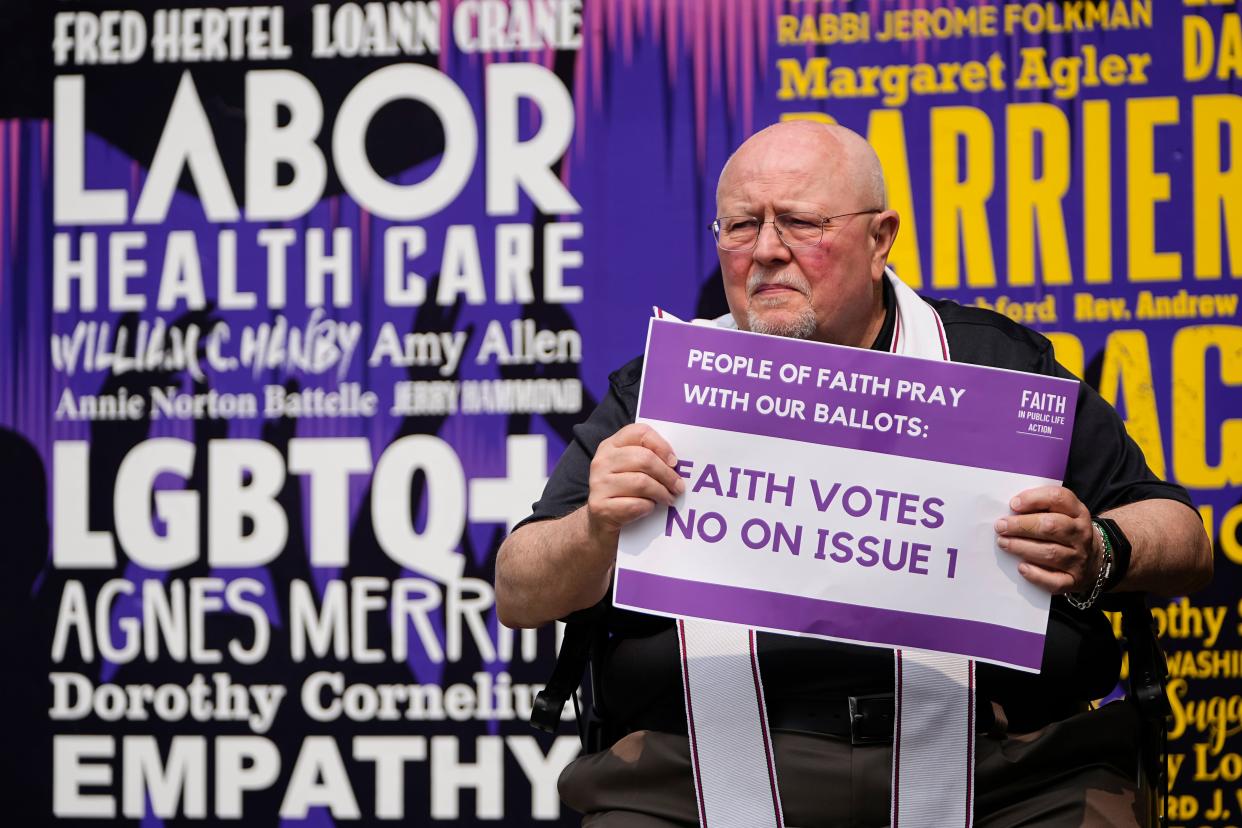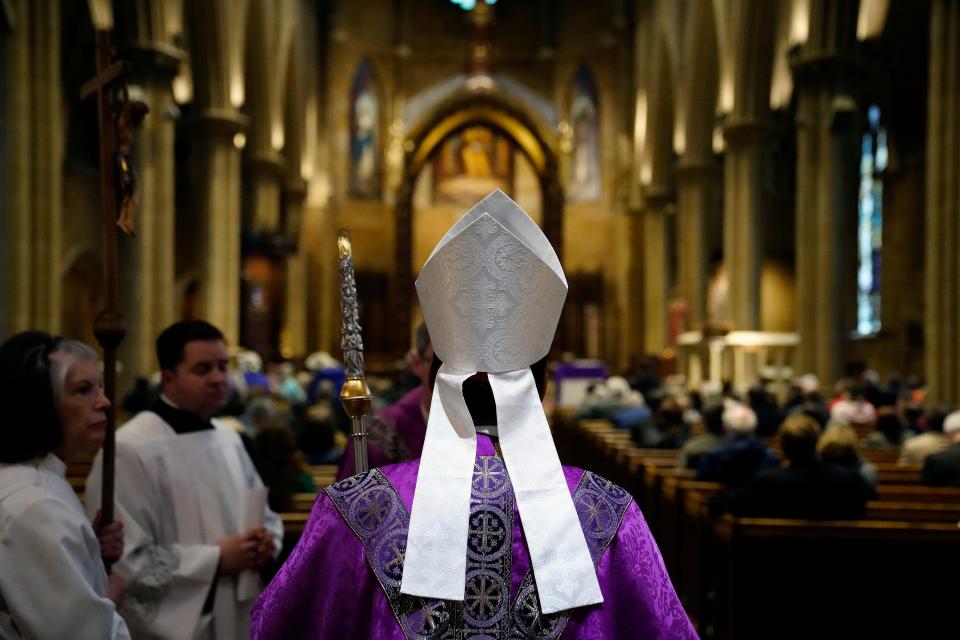Aug. 8 election: Churches, ballot measures and lobbying law, explained

In the run-up to two statewide referendums, religious groups in Ohio have been engaged in a flurry of advocacy work.
Clergy have spoken from the pulpit, sent emails, posted fliers and held rallies both for and against Issue 1, which would make it more difficult to change the Ohio Constitution and will be voted on Aug. 8.
Faith leaders are also carrying out advocacy — and making monetary donations — around a measure that seeks to enshrine abortion rights in the constitution, which will be on the Nov. 7 ballot. For example, the Catholic dioceses of Columbus, Cleveland and Cincinnati have collectively donated $900,000 towards stopping the abortion amendment.
Amid this spate of activity, some members of the public are asking: are nonprofit religious organizations legally allowed to lobby?
Federal law on nonprofits, lobbying and campaigning
In short, the Internal Revenue Code allows churches and other nonprofit groups to lobby for ballot measures but prohibits them from campaigning on behalf of candidates.
“That's (an) important legal distinction, which applies to not just churches but all charities,” Lloyd Mayer, a University of Notre Dame law professor who specializes in advocacy by nonprofits, told The Dispatch. “There is nothing illegal or improper about a church lobbying, including about a ballot initiative or referendum.”
The IRS automatically considers churches to be 501(c)(3) nonprofits, which makes them tax-exempt and eligible for tax-deductible donations. By contrast, non-religious nonprofits must follow an application process.
To maintain their nonprofit status, churches cannot “participate in, or intervene in (including the publishing or distributing of statements), any political campaign on behalf of (or in opposition to) any candidate for public office,” according to the I.R.S.

But advocacy for or against a ballot measure in a statewide referendum falls under the category of “lobbying,” which is permissible, within limits.
According to the law, a church's or other religious organization's lobbying must constitute no more than an “insubstantial part” of its activities. The definition of “insubstantial” has not been made explicit by the courts, but it is sometimes defined as no more than 5% of overall activities, including those conducted by volunteers.
“As long as you're doing lots of other stuff, which of course most churches are doing … (then) some statements about the ballot initiative from the pulpit or otherwise … that's not going to cross a (legal) line,” Mayer said.
More: Ohio abortion rights issue: Fall race looks to be expensive, fueled by out-of-state money
Nonprofits' freedom of speech and the Johnson Amendment
While the IRS rules on nonprofits’ lobbying activities are relatively permissive, the law prohibiting endorsement of candidates — known as the Johnson Amendment after then-Sen. Lyndon Johnson, who introduced it in 1954 — has drawn criticism in the past.
Former President Donald Trump tried to prevent the IRS from enforcing the Johnson Amendment, claiming it infringed on churches’ freedom of speech.
“The counter to that is: You don't have to claim the benefits of tax-exempt status,” said Mayer. “Churches and other charities’ leaders are free to endorse candidates and to give contributions, but if the organization is going to claim the benefits of tax-exempt status and receiving deductible contributions, then Congress can put conditions on that.”
Despite the law, some clergy have endorsed candidates from the pulpit. A 2022 investigation by ProPublica and The Texas Tribune found around 20 violations of the Johnson Amendment over a two-year period, some of which the IRS never investigated.
In most cases, the IRS issues warnings to churches that violate the Johnson Amendment.
Mayer said he is aware of only one church that has ever lost its tax-exempt status for political speech, and that the IRS has been cautious in policing churches after receiving heavy criticism for the “Tea Party scandal” in 2013. In that scandal, the agency subjected groups seeking tax-exempt status to greater scrutiny if they had the words “tea party” in their name.
“Because of that, the IRS has taken a very hands-off approach when it comes to enforcing either the lobbying limitation or the Johnson Amendment,” Mayer said.
Religious missions, political power
Brian Hickey, executive director of the Catholic Conference of Ohio, the church's state lobbying arm, said that being able to lobby regarding ballot measures is important to Catholics' overall mission.
“Lobbying on ballot issues that create just and unjust laws is one way we encourage Catholics to participate in promoting the common good,” Hickey said.
“As for the Johnson Amendment, the Catholic Church does not have any issue with not endorsing specific candidates…The Church comments on moral and social issues and shares related teaching but does not endorse political parties or candidates,” he said.
However, Bill Fullarton, the founder of the central Ohio chapter of the Freedom from Religion Foundation, said he feels churches have been given too much leeway by the IRS.
“When you're considering the power of some of these mega churches – with congregations of tens of thousands of members – that constitutes a whole lot of power,” he said.
More: Ohio Catholic bishops neutral on Issue 1. Columbus Bishop Fernandes' stance is less clear
Correction: a previous version of this article used the term "Internal Revenue Service code," but the name of the federal law is actually the Internal Revenue Code.
Peter Gill covers immigration, new American communities and religion for The Dispatch in partnership with Report for America. You can support work like his with a tax-deductible donation to Report for America at:bit.ly/3fNsGaZ.
pgill@dispatch.com
This article originally appeared on The Columbus Dispatch: Religious organizations, Ohio Issue 1, and lobbying explained

